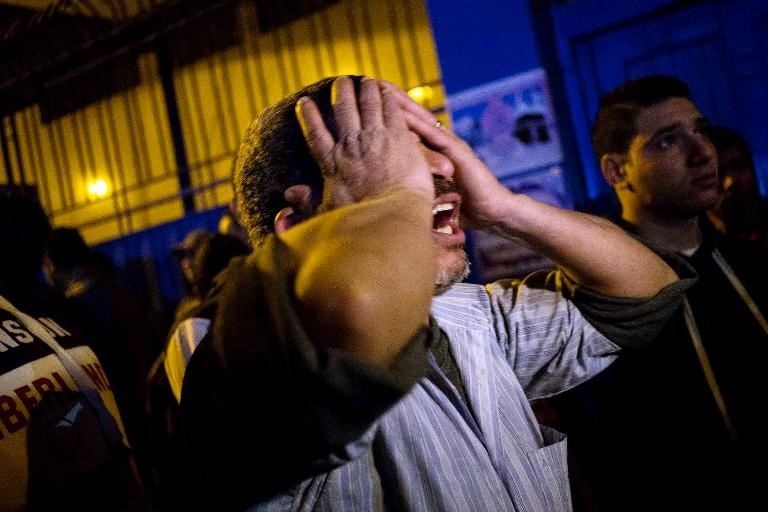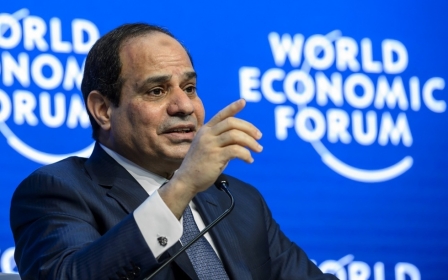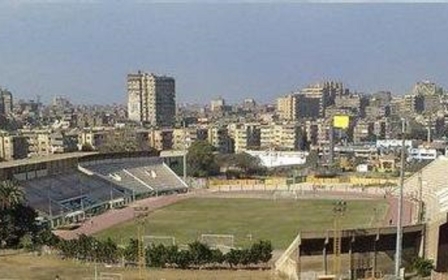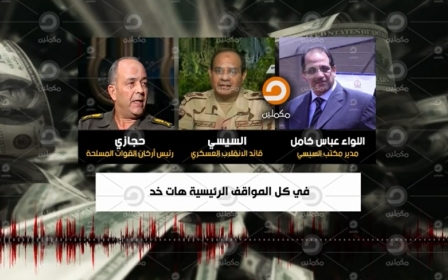Conflicting accounts after bloody Cairo stadium clashes

Egypt's President Sisi has paid tribute to the victims of Sunday night's football stadium disaster, during which up to 40 people were killed.
In a statement released on Monday afternoon, Sisi stressed that Egyptians should wait for the relevant authorities to complete their investigation and "uncover the causes" of what have become known as the "Air Force Stadium Events".
The deaths occurred on Sunday night ahead of a Premier League match, as large numbers of fans attempted to enter the eastern Cairo stadium without paying for admission, according to statements from the Egyptian authorities.
Most of the supporters were members of Ultras White Knights, hardcore fans of the Premier League Zamalek Football Club known for clashing with police during the 2011 uprising against Hosni Mubarak and since.
While fans were attempting to enter the stadium on Sunday night, police barricaded most entrances and only allowed entry through one small, barb-wired doorway, eye-witnesses later said.
Authorities say a stampede then broke out.
In the aftermath of the incident, Zamalek football club, whose fans were involved in the deadly clashes, on Monday sanctioned a player found to have "links" with the White Knights.
Amr Gaber, a 22-year-old midfielder who has represented his country at the World Cup, had his contract with Zamalek renewed late last week.
However, on Monday the club revoked the decision after Gaber refused to play in Sunday night's match, which went ahead after a 40-minute delay despite the violence outside the stadium.
Authorities have suspended all football league matches indefinitely in the wake of the incident.
Conflicting reports
An official report by Egypt's forensic authority said on Monday that the deaths had all been caused by "injuries to the chest and face and suffocation caused by a stampede".
However, many football supporters have disputed the official version of events, accusing the police of using excessive force and committing a "massacre".
After the disaster, dozens of people took to social media, publishing eye-witness accounts that deviated from ministry statements.
One of the accounts from a Zamalek fan said a large group of supporters had been crowding outside the stadium ahead of the game when police "suddenly" fired tear gas.
The Twitter hashtag #AirForceMassacre, a reference to the stadium that was the scene of Sunday's bloodshed, was trending in Egypt, Saudi Arabia and Jordan on Monday.
Opposition news sites circulated documents purporting to be autopsy reports indicating that some of the victims died as a result of tear gas inhalation.
Unverified amateur footage shows dozens of police, clad in riot gear, struggling to contain a wave of fans near the smashed metal barricades on the perimeter of the stadium. An armed officer is later seen approaching the scene from behind and firing birdshot at the crowd.
A police car was set alight during the clashes, although no officers were reported to have been injured at the scene.
Some news sites put the number of deaths as high as 40 - however, state-owned daily al-Ahram reported that 16 people were killed during the clashes, devoting the majority of its article to a rundown of the ensuing match.
According to the site, security forces were stationed outside the morgue that received the victims' bodies to prevent further violence from breaking out - 10 officers were lightly injured, the site reported.
The head of Zamalek football club, Murtada Mansour, put out a statement on Sunday expressing his support for the authorities, saying he had personally asked the interior ministry to intervene in the clashes.
"The police did not fire a single bullet," Mansour told right-wing daily Yaum Sabie, stressing that the deaths were caused by the "thuggery" of fans.
Representatives of the opposition April 6 Movement, meanwhile, alleged that the "massacre" was carried out under orders to deflect attention from recent alleged leaks that reported comments made by Egyptian President Abdel Fatah al-Sisi, in which he said that he "despises" Arab Gulf rulers, despite their substantial financial aid to Egypt, and in contrast to his public statements of lavish praise towards the oil-rich states.
Rumours of resignation
In the wake of the disaster, Egypt's Prime Minister Ibrahim Mahleb held an emergency meeting with his ministers of interior, health and sport.
Opposition newspapers reported on Monday that Interior Minister Mohammed Ibrahim had tendered his resignation - however, Ibrahim denied the news, saying he had been in his office from 6am (4:00 GMT) to follow up on Sunday's events.
Less than 24 hours after the bloodshed, funerals are now taking place for those killed during the incident.
On Monday, police clashed with mourners at the funeral of one of the victims, Mohammed Saeed, at a ceremony attended by hundreds of people.
No injuries were reported.
Sunday was the bloodiest day for Egyptian football since the events at the Port Said Stadium three years ago, when more than 70 fans were killed during fierce rioting.
Restrictions on the number of fans allowed to attend matches were imposed after the tragedy in Port Said, but those regulations were just lifted last week.
Piles of shoes were stacked up near the stadium as a makeshift memorial to those who died on Sunday.
Middle East Eye propose une couverture et une analyse indépendantes et incomparables du Moyen-Orient, de l’Afrique du Nord et d’autres régions du monde. Pour en savoir plus sur la reprise de ce contenu et les frais qui s’appliquent, veuillez remplir ce formulaire [en anglais]. Pour en savoir plus sur MEE, cliquez ici [en anglais].




